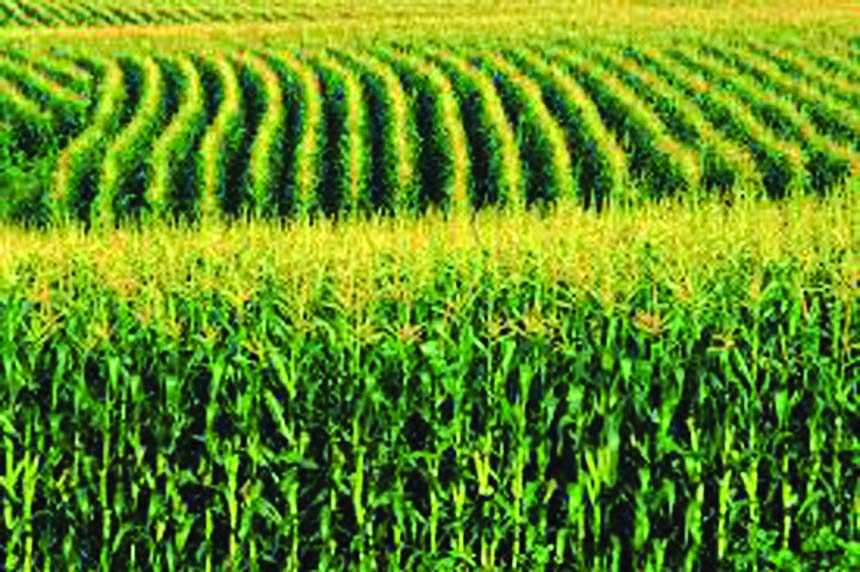
BSS, Rangpur :
Adoption and popularisation of the climate resilient cropping patterns with latest technologies can further increase crop production at reduced costs to attain sustainable food security despite adverse impacts of climate change.
Adoption of conservation agriculture (CA)-based technologies side by side mechanisation of agriculture has already been making farm activities more profitable for the farmers improving environment, ecology, bio-diversity, soil health and fertility.
Associate Director- Agriculture of BRAC International (South Asia and Africa) Dr MA Mazid said adoption of the latest technologies reduces crop durations, helps pair-row-sugarcane farming with mugbean/chilly intercropping, nutrient- fertiliser managements, drought escaping and lower labour, fuel and irrigation costs.
He narrated as how the farmers are now being benefited through using the CA-based minimum tillage or zero tillage, direct seeded rice, bed- planting in light texture soil at different areas in the country amid changing climate.
Executive Director of North Bengal Institute of Development Studies Dr Syed Samsuzzaman said adoption of the latest technologies and mechanisation of agriculture increase crop yield, save water, facilitate crop intensification and remunerative markets.
He suggested for expanded farming of short duration, drought- , saline- and flood- tolerant rice adopting rice- wheat-mugbean/jute, rice-potato-relay/maize, rice- vegetables- wheat, rice-sugarcane with garlic, onion/vegetables cropping patterns.
To facilitate the process, he stressed quicker dissemination of the latest technologies among the farmers with increased subsidies for easier procurement of the necessary machineries, inputs, spares and other materials by them.
Horticulture Specialist of the Department of Agriculture Khondker Md Mesbahul Islam said adoption of CA-based technologies through public-private and GO- NGO collaborations has been becoming popular among the farmers in recent years.
He said quick delivery of the latest agriculture technologies for system- based crop diversification has also been helping the farmers in coping with climate change impacts to increase crop production to ensure food security improving livelihoods.
Extension Agronomist Anarul Haque at Rangpur Hub of the USAID-funded Cereal Systems Initiatives for South Asia narrated benefits of crop rotation technology in which crops are planted in minimum, no-till or reduced tillage with some crop residue retention on soil surfaces to reduce unproductive losses of water.
He also explained benefits of successful introduction of short duration rice farming, rice-wheat-mugbean/jute, rice- potato- relay/maize, rice- vegetables-wheat and rice- sugarcane with inter-crops like garlic, onion/vegetables cropping patterns.
“The technologies have been increasing crop yield saving water, facilitating crop intensification, quality seeds, quality planting machine prototypes and availability of the spares, quality inputs and remunerative markets for the produce,” he said.
Agriculture and Environment Coordinator of RDRS Bangladesh Mamunur Rashid stressed for quicker delivery of latest technologies, providing training to the farmers on pesticide, herbicide and fertiliser managements, proper usages of machineries.
“Adoption of the latest technologies has been making farm activities more profitable increasing crop production, including cereal crops like rice, maize and wheat, to ensure food security improving soil health, ecology and environment,” he added.
Adoption and popularisation of the climate resilient cropping patterns with latest technologies can further increase crop production at reduced costs to attain sustainable food security despite adverse impacts of climate change.
Adoption of conservation agriculture (CA)-based technologies side by side mechanisation of agriculture has already been making farm activities more profitable for the farmers improving environment, ecology, bio-diversity, soil health and fertility.
Associate Director- Agriculture of BRAC International (South Asia and Africa) Dr MA Mazid said adoption of the latest technologies reduces crop durations, helps pair-row-sugarcane farming with mugbean/chilly intercropping, nutrient- fertiliser managements, drought escaping and lower labour, fuel and irrigation costs.
He narrated as how the farmers are now being benefited through using the CA-based minimum tillage or zero tillage, direct seeded rice, bed- planting in light texture soil at different areas in the country amid changing climate.
Executive Director of North Bengal Institute of Development Studies Dr Syed Samsuzzaman said adoption of the latest technologies and mechanisation of agriculture increase crop yield, save water, facilitate crop intensification and remunerative markets.
He suggested for expanded farming of short duration, drought- , saline- and flood- tolerant rice adopting rice- wheat-mugbean/jute, rice-potato-relay/maize, rice- vegetables- wheat, rice-sugarcane with garlic, onion/vegetables cropping patterns.
To facilitate the process, he stressed quicker dissemination of the latest technologies among the farmers with increased subsidies for easier procurement of the necessary machineries, inputs, spares and other materials by them.
Horticulture Specialist of the Department of Agriculture Khondker Md Mesbahul Islam said adoption of CA-based technologies through public-private and GO- NGO collaborations has been becoming popular among the farmers in recent years.
He said quick delivery of the latest agriculture technologies for system- based crop diversification has also been helping the farmers in coping with climate change impacts to increase crop production to ensure food security improving livelihoods.
Extension Agronomist Anarul Haque at Rangpur Hub of the USAID-funded Cereal Systems Initiatives for South Asia narrated benefits of crop rotation technology in which crops are planted in minimum, no-till or reduced tillage with some crop residue retention on soil surfaces to reduce unproductive losses of water.
He also explained benefits of successful introduction of short duration rice farming, rice-wheat-mugbean/jute, rice- potato- relay/maize, rice- vegetables-wheat and rice- sugarcane with inter-crops like garlic, onion/vegetables cropping patterns.
“The technologies have been increasing crop yield saving water, facilitating crop intensification, quality seeds, quality planting machine prototypes and availability of the spares, quality inputs and remunerative markets for the produce,” he said.
Agriculture and Environment Coordinator of RDRS Bangladesh Mamunur Rashid stressed for quicker delivery of latest technologies, providing training to the farmers on pesticide, herbicide and fertiliser managements, proper usages of machineries.
“Adoption of the latest technologies has been making farm activities more profitable increasing crop production, including cereal crops like rice, maize and wheat, to ensure food security improving soil health, ecology and environment,” he added.

